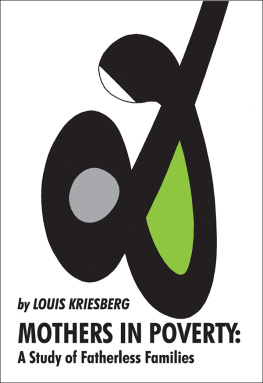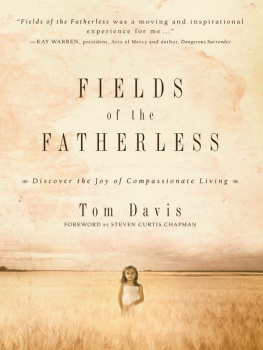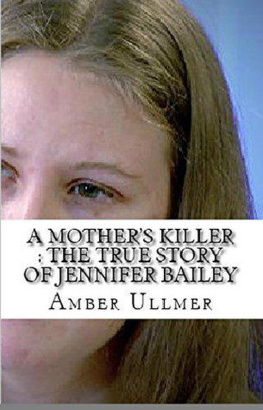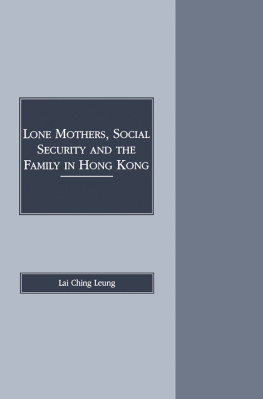First published 1970 by Transaction Publishers
Published 2017 by Routledge
2 Park Square, Milton Park, Abingdon, Oxon OX 14 4RN
711 Third Avenue, New York, NY 10017, USA
Routledge is an imprint of the Taylor & Francis Group, an informa business
Copyright 1970 by Louis Kriesberg
All rights reserved. No part of this book may be reprinted or reproduced or utilised in any form or by any electronic, mechanical, or other means, now known or hereafter invented, including photocopying and recording, or in any information storage or retrieval system, without permission in writing from the publishers.
Notice:
Product or corporate names may be trademarks or registered trademarks, and are used only for identification and explanation without intent to infringe.
Library of Congress Catalog Number: 2006050010
Library of Congress Cataloging-in-Publication Data
Kriesberg, Louis.
Mothers in poverty : a study of fatherless families / by Louis Kriesberg.
p. cm.
Originally published: Chicago : Aldine Pub. Co., 1970.
Includes bibliographical references and index.
ISBN 0-202-30870-7 (alk. paper)
1. Unmarried mothersNew York (State)Syracuse. 2. Poor single mothersNew York (State)Syracuse. 3. Fatherless familiesNew York (State)-Syracuse. 4. Women heads of householdsNew York (State)Syracuse. 5. Welfare recipientsNew York (State)Syracuse. 6. Paternal deprivation. 7. PovertyNew York (State)Syracuse. I. Title.
HV700.5K73 2006
362.83920974766dc22
2006050010
ISBN 13: 978-0-202-30870-8 (pbk)
T o
my mother
and
D aniel and J oseph
and
to
L ois
T HIS BOOK is about mothers and children in poor fatherless families. But it is not simply about their plight. It attempts explanations of the way of life of poor people and the possible role their way of life plays in the intergenerational transmission of poverty. My purpose in writing this book was to assess basic alternative explanations. Two approaches toward such explanations are examined in detail. One emphasizes the development and maintenance of a subculture of poverty. The other emphasizes the contemporary circumstances that make people poor, keep them poor, and to which the poor respond.
To assess these general approaches more specific questions need to be phrased. This questioning is done in the first chapters of the book. These questions are derived from larger ones, Do poor people develop a distinctive way of life that inhibits their movement out of poverty? Is there a way of life passed on from one generation to the next that keeps each generation poor? Do certain social conditions impose poverty and are the adaptations that poor people make to such conditions readily modifiable if the conditions change?
The assessment is made by seeking to clarify the issues in contention and by bringing relevant data to bear on the contending ideas. The data are drawn from a wide range of work done by others and particularly from a study of families living in and near low-income public housing projects in one city. The study was focused upon certain conditions: marital arrangements, housing and neighborhood, employment, and the public welfare system. The major subject of analysis is one segment of the poor: mothers with young children but without husbands.
The poverty of these mothers is related to their role as women in this society. Insofar as women are and expect to be economically dependent upon men, a marriage broken by death, divorce, or desertion threatens the mother and her children with poverty, unless the government or her former husband or her relatives provide enough money to keep the family out of poverty. Some of this threat would be alleviated if women were expected from childhood to hold jobs, were educated for employment, had equal job opportunities, received equal pay, and had child-care facilities. Such circumstances would also help raise families with husband-fathers out of poverty, as working wives presently often do. Such circumstances might also appear to create new difficulties for the well-being of children and marital stability. The findings and discussion in this book should help realistically to assess these supposed difficulties.
Although focusing upon one segment of the poor, the issues raised and analyzed pertain to poor people generally. Furthermore, given the interrelated nature of the conditions associated with poverty and the responses people make to those conditions, the findings have pertinence to topics such as stratification, marriage, education, blacks, and the urban community. Finally, elucidating the limitations of the subcul-ture-of-poverty approach has important theoretical and policy implications. Those are best discussed after presenting the analysis.
T HIS BOOK IS BASED UPON DATA collected for the Public Housing and Social Mobility Study. This study was conducted at the Youth Development Center of Syracuse University and supported by funds from the Ford Foundation and the Welfare Administration of the Department of Health, Education and Welfare (grant number 042), and the National Science Foundation (grant GP-1137), to the Computing Center.
Many persons cooperated in the project and I want to use this opportunity to acknowledge their contributions to the overall study.
The Syracuse Housing Authority, under the chairmanship of Jacob Lattiff, granted approval for the cooperation that made the study possible. The cooperation of the Housing Authority staff, notably Fenton Gage, Beatrice McKibbon, and William McGarry, was very great. Robert Hale and William Chiles of the Department of Urban Improvement of the City of Syracuse cooperated in the study of families affected by urban relocation.
Irwin Deutscher was primarily responsible, with the collaboration of Lee J. Cary, for the formulation of the original design of the study. They were assisted by George Freskos, Ronald Ley, and Donald Reeb. During the major data collection phases of the study, Seymour S. Bellin and I were co-directors of the study. Helen Icken Safa aided in the preliminary field work and directed the participant observation phase of the study. Jerome Cohen was field director during the preliminary investigations and helped develop the questionnaires. The study design and questionnaires benefited from the consultations of Robert K. Merton, Marc Fried, David E. Hunt, and John Dopyera.
Several graduate assistants served for varying lengths of time in many capacities. Laurence T. Cagle, Charlotte Mal-lov, James R. Mcintosh, Alphonse J. Sallett, Thelie Trotty, Joan T. Weber, Roland Werner, and Abdel Zikry aided in code construction, card cleaning, and analysis at various stages in the study. The participant observers were David Cumming, George A. Freskos, Elizabeth Lowe, and Mary Reibson.
Virginia B. Brown supervised interviewing the panel of public housing applicants and Dagny Henderson supervised the field operations of the cross-sectional phase of the study. Dean Lindeman supervised the several coding operations of the interview data. Beverly A. McGarry handled many of the problems in the relations between ideas, computers, and data. The Syracuse University Computing Center, under Director Otway O. Pardee, provided the necessary services for processing the data; I am indebted to Dominick Auricchio of the Computing Center for his aid. Crestline Littlefield, Susan Drucker and the Youth Development Center typing staff prepared the many forms used in the study and typed and retyped the working papers, and reports which preceded this book, as well as the revisions of this book.
The writing of this book has benefited from the previous work on the study in collaboration with Seymour S. Bellin and Helen Icken Safa. The preparation of the book has also been aided by the suggestions and comments of Robert H. Hardt, Irwin Deutscher, Lee J. Cary, Howard S. Becker, S. M. Miller, Alexander J. Morin, Alphonse J. Sallett, Elizabeth Thompson, and my brother Irving. My wife, Lois, contributed many insights in the course of my work, some of which I have been able to incorporate in the book.








